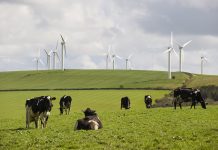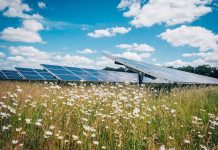Scotland’s expansion of low carbon heat and light is set to speed up, as Green Party leaders step up to power in a national government for the first time in Britain’s history.
Scots Green co-leaders Lorna Slater and Patrick Harvie will join Holyrood’s SNP-led administration, under a ‘confidence and supply’ arrangement which falls short of a formal coalition.
The parties had been in negotiations since May’s elections, when Scotland’s system of proportional representation left the SNP one member short of a majority.
In terms of energy, a draft document on shared policy released on Friday commits both parties to a transition ‘that is truly just, but also fast enough to protect the planet’.
“While electricity has already been largely decarbonised, our plans will see a significant increase in electricity demand for heating and transport. To accommodate this, we will support the continued and accelerated deployment of renewable energy,” the blueprint pledges.
Between eight and 12 more GW of turbines installed onshore by 2030, will add to 11GW more installed at sea, the document promises.
Scotland’s oil industry, and particularly development of the Cambo field in waters over a kilometre deep 125km north west of the Shetlands, are believed to have formed an obstacle in talks. The blueprint is clear that the SNP and Greens “….do not entirely agree on the role of the oil and gas sector”.
But it states that, “given the urgency of the climate emergency, …we cannot ignore the concern that unlimited extraction of fossil fuels is simply incompatible with protecting the planet”.
A £500m ‘Just Transition’ fund will support re-deployment of oil and gas workers in Moray and Scotland’s oil-dominated North East into new jobs away from hydrocarbons.
“To maximise the economic benefits of the transition, and to create quality green jobs, we will do more to support the growth of the supply chain and invest in the infrastructure we need”, say the agreement.
A study of how Scotland’s energy needs square with its Net Zero goals will report by the end of 2022, the parties promise. And Holyrood must be represented, the parties demand, on a new pan-UK body to review extraction licences in the light of climate science and the Paris goals.
Plans to transition high-carbon sectors such as chemicals and cement will be prepared.
On green homes and buildings, the SNP and Greens promise to phase out installation of new gas boilers in off-grid areas by 2025, and on the grid by 2030.
A budget of £1.8 billion will be established to spur efficiency upgrades in the wake of Covid-19. Subsidies for oil and LPG boilers will end immediately, the document pledges.
Low-carbon heating will benefit from £400 million to support district networks, fed by large scale heat pumps. Subsidies will be increased to home owners installing low-carbon heat.
Patrick Harvie, the Greens’ co-leader said Scotland’s government “must do everything in our power to tackle the escalating climate and nature emergencies to deliver a just transition for all”.



